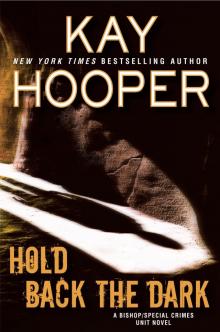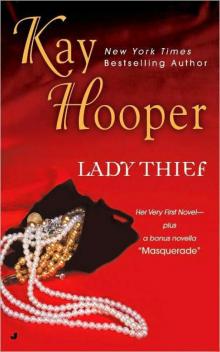- Home
- Kay Hooper
Shades of Gray Page 9
Shades of Gray Read online
Page 9
Josh smiled in approval and looked at Zach. “Well?”
“It’s all right as far as it goes,” the big security chief said. “But how about all the guns that’ll be pointed our way once we get out of the bird? Lucio is one thing; what about Sereno? Think he’s going to stand tamely by while we offer Sara a lift out of there?”
Kelsey, frowning at nothing again, said quietly, “I think he will. Not tamely, no; he isn’t a tame man. But if she wants to leave, especially in Josh’s charge, he’ll let her.”
Raven, who was sitting in her husband’s chair behind the desk, said suddenly, “She loves him, you know.”
Josh looked back at her. “Yes, that was my impression. Still.”
“Still,” she agreed, “she wasn’t asked, she was taken. And Siran said she was mad as hell.”
“It’s the revolution,” Shannon said suddenly. She looked up to find everyone gazing at her quizzically, and she flushed slightly. She was still new enough to this group to be a little shy among them, a little uncertain, but her own recent experiences made her feel deeply for Sara Marsh.
Derek smiled down at his wife. “What about it, honey?”
Drawing courage as always from those loving, wise old eyes, she smiled in return and looked back at the others. “It’s at the center of everything,” she said. “It cuts Kadeira off, isolates it. It’s dangerous to Sara because she can be used to hurt President Sereno. He knows that. Think of the pressures on him, on them both. They can’t—they aren’t let alone to be just a man and woman. And they should be.”
After a moment of silence Kyle said quietly, “There’s that. We can offer Sara a choice. We can get her out of danger, at least for a while. And what have we solved? They’ll be apart again, and she’ll be on the run as long as Lucio—or someone else—wants to hurt Sereno. Shannon’s right. It’s the revolution.”
Josh lighted a cigarette and, surprising no one, said tersely to Kelsey, “What’ll it take to stop the revolution?”
“Lucio dead or otherwise taken out of action,” Kelsey answered without hesitation. “That’d do it, at least for a while. Because, this time, it’s a feud, as you said. Then—time and money. Given both, Sereno could get the economy on its feet, and his people would likely be satisfied once they saw progress being made. That island’s good raw material for another Caribbean paradise. But, hell. Josh, after half a century of revolution, who’s going to pour money into that island?”
“Someone,” Derek said lazily, “always can.”
Zach said very dryly, “No doubt someone will.”
Ignoring that comment. Josh said, “Lucas, Kyle, you two handled General Ramsey last time. How about it?”
“The reconnaissance flight? Sure,” Lucas said, and Kyle nodded.
“All right, then,” Josh said. “First thing in the morning, here’s what we’ll do.”
And he told them. Zach didn’t like it, of course; he much rather would have gone to Kadeira alone. Without an ounce of conceit in his soul, he still preferred to slay dragons himself and keep friends and loved ones away from the beasts. The only problem was, those friends and loved ones were dragon slayers too.
They wouldn’t be put under glass.
Dammit.
Sara endured a slightly painful visit from the doctor the next morning, was pronounced recovered and fit. The bandage over her temple was replaced with a smaller one, and the doctor said the stitches could come out in a few days. Sara wasn’t surprised by the doctor’s verdict of recovery since she felt fine, but she was glad the report eased Andres’s obvious concern.
She and Andres were still being careful, of course. But the reasoning behind their caution was different from the previous day. Then, both had half hidden behind walls; today they were cautiously building a bridge.
Yet Sara was conscious as never before of the hunger in Andres’s eyes, and very aware of the matching hunger in herself. Like everything between them, it was too strong to ignore, too complex to rest placidly under the convenient label of desire. It had filled her dreams during the night, an ache that wouldn’t leave her. It hovered all around today, sharpened by abrupt stabs of longing.
Part of her wondered why they waited, but another part of her was still troubled by a lack of understanding. She felt strongly that the more she understood him, the more solid their bridge would become.
And there was so much about him she needed to understand. Not just the worst of him, but rather what brought the worst out of him. What drove him? What vision had sent a young man to war in determination? How had he become the man he was? And what was it that he would lose if he lost her?
Questions she could ask him, certainly. But she thought she should find the answers for herself—and she didn’t know how to do that.
The morning passed. Aware that her nearness was a distraction, she left Andres and the colonel to their work that afternoon. She went out into the garden where the early coolness was burning away under the heat of the sun and found the old gardener, Carlos, at work among the roses. Happily, he remembered her and carefully explained in his halting English how he had grown her roses for her.
Sara borrowed gloves and tools, working along with him and listening to him as he talked to both her and the plants impartially and with affection. She was scarcely aware that the sun grew hotter, and she looked up with a start when a shadow fell over her.
Andres bent to place a wide-brimmed straw hat atop her head before she could say a word. “You’ve forgotten the sun again,” he said, half scolding.
Carlos loosed a stream of rapid Spanish to his president, his tone contrite, and Andres responded briefly in the same language, kindness in his voice. Then he looked back down at Sara. “Carlos is aghast that he forgot you were unaccustomed to the sun,” he told her.
“It wasn’t his fault. I forgot too.”
“That’s what I told him.”
Sara shook her head as she reached up to adjust the hat. “I really should learn Spanish,” she said, half to herself.
“I’ll teach you, mi corazón.”
She looked up at him questioningly.
“My heart,” he translated, smiling.
Sara wondered when it had gotten hard to breathe; she hadn’t noticed until now.
Andres didn’t seem to expect a response. “Don’t stay out here too long, Sara. Just because the doctor said you were recovered doesn’t mean you shouldn’t take care. All right?”
She nodded and watched him stride back toward the house. He must have seen her from the window of his office, she realized, and had left Durant waiting while he went to find her hat. Almost absently she leaned forward to continue weeding the rose bed, half hearing Carlos as he went on talking to the plants.
But even as she worked, Sara glanced up from time to time, seeing in the distance a glimpse of the high iron fence, hearing an occasional shout or laugh from one of the soldiers walking the perimeter. She saw that the parapet of the house was manned now, as it hadn’t been when she’d arrived; half a dozen soldiers paced warily, alert.
This was Andres’s life. With peace in his land, could he achieve tranquillity in himself? Perhaps. But Andres was a man of power, and men of power are always targets; Sara knew that. So there would always be guards and fences and caution. She had learned caution these last years, had learned to be wary—but she had been free. She had been able to walk public streets alone, had eaten in restaurants, had sat peacefully in theaters and parks. She had been a target only to a handful of men who saw her as a tool.
If she remained with Andres, everything would be different.
Was love strong enough to survive in a cage? Was her love strong enough? And was she, herself, strong enough to commit her life to loving a man of power, a complex, charismatic man who would always be a target?
It all came down to that question, as well as her lack of understanding. And Sara didn’t know how to find that answer, either. Time would provide it, but time was a doubtful commodity on Kadeira. Yet w
hat could she do? She had asked for time even though she knew how uncertain it was, even though she knew that they couldn’t long remain in limbo.
But how could she discover the extent of her own strength? There was no mountain to climb here, no ocean to cross or battle to be won; there was no single, definitive test of her courage. She had the hollow feeling that if ever there would be a moment of blinding certainty when she could say, “I’m strong enough,” it would occur far in the future, with years of life’s testing behind her.
She couldn’t wait for that. Andres, offering a total commitment of his own, would accept no less from her—and deserved no less.
“Why do you come to me when you’re still afraid?”
Restless, Sara returned the gardening gloves and tools to Carlos and thanked him, then went back to the house. In the kitchen, Maria scolded her for staying out in the sun too long, gave her iced tea, and chattered brightly while Sara obediently finished the cold drink.
She felt, peculiarly, that a veil had been drawn between herself and everyone else, that she was looking through it at a world with softened, blurred outlines. Colors were muted, sounds muffled. It was as if the world were unreal, distant, pushed away by the conflict raging in her mind. And the struggle within her seemed to gather energy, force, swirling with a violence that pushed the world even farther away. She felt still, rooted, trapped in the tiny eye of a hurricane while she waited for the storm to overtake her.
Leaving Maria with polite thanks and hardly noticing the housekeeper’s worried look, Sara wandered through the house. She passed the closed office door without glancing at it, fearing that the sheer force of her longing would somehow summon Andres to her. She was too bewildered to face him now.
She went up to her suite and took a cool shower, then changed into white shorts and a green terry-cloth tank top. Brushing her hair automatically before her dresser mirror, she noted idly that her outfit was revealing. As if it were someone else she saw, she studied golden flesh, slender curves. She looked at her face with detachment, wondering what was there to command the love of a man. It was a face, her own and familiar. Green eyes and a small nose, and a mouth that looked vulnerable.
She turned away from the mirror and, barefoot, padded out into the hall and then to Andres’s room. She had never been inside this room but opened the door without hesitation and went in. She was vaguely conscious that she was looking for something, searching for answers she badly needed.
She felt Andres as soon as she stepped across the threshold. This was the private sanctuary of the man rather than the open office of the president. Here he slept, here he dressed, and, in the bathroom off to the left, here he showered and shaved.
Sara closed the door and wandered slowly around the room, settling finally in a big chair near the foot of the bed. Like most of the furniture in the house, this room contained old, massive pieces, gleaming softly with the patina of age and care. The bed was a huge four-poster, the chest as tall as she was, the dresser long. There was a shelf filled with books near the door, an eclectic collection ranging from poetry and the classics to works on the tactics and strategy of war.
But Sara wasn’t looking at the furniture or books; she barely noticed the thick carpet or the drapes drawn back from the French doors leading onto the balcony. She looked instead at a single wall across from her chair where a large framed oil painting hung. It was easily viewed from this chair and from the bed, and she wondered how often he stared at it.
She had no idea where he could have gotten it, or who had painted it. She thought it had probably been privately commissioned by Andres years ago, perhaps just after he’d come to power. She knew only that she was gazing on the vision that had carried Andres through a revolution—and through all the years since.
The painting was of Kadeira, but it was not the Kadeira she had seen. It had been painted from the angle of the harbor, with the only real city on the island as the focus. And there were no shorn buildings, no bombed remains of cars or trucks, no rubble. And no scars showing through the whitewash. This was a city with gleaming windows and clean-swept streets, small shops open for business, and smiling people moving along the sidewalks.
There wasn’t a soldier, a gun, or a jeep in sight. Nor, Sara realized, was this a painting of vaulting ambition; there were no signs of great wealth or well-heeled tourists. There was a small hotel on the right near a ribbon of beach, but it wasn’t a glass-and-steel monster meant to house the rich; it was tucked away in the lee of a hill, pretty and pleasant and no doubt comfortable. In the distance, between jungle and mountains, there was a tilled field here and there; in the foreground a fishing boat sailed toward the dock, riding low in the water with a satisfying catch. Children played on the sand.
Sara swallowed hard, feeling her throat ache. Andres didn’t ask for much, it seemed. Unlike some leaders, he didn’t seek to make his country a great power. He only wanted his people to be comfortable, well fed, safe, and happy.
She looked at the little hotel again, realizing suddenly that it almost existed, that it was one of the buildings she had seen that had been partly constructed before the rebels had gutted it.
He was trying, she thought. Trying so hard. And she felt an abrupt, grinding hatred for Lucio and those like him, hating them for coming between Andres and his beautiful dream.
The tatters of illusion in his eyes, his soul. The last fragile tendrils of a cherished dream.
She was barely aware of shadows lengthening in the room as the sun set outside, staring at the painting and hurting inside. It was worth fighting for, that dream.
“… the love I have for you is the best of me. And what will I be if I lose that?”
Sara realized, slowly, that she finally understood Andres. And understood what she meant to him. His dream had sustained him for a long time, a goal to work toward, but discouragement and bitterness were growing. In his efforts to achieve his goal, Andres had clamped down harder and harder, taking ruthless steps out of necessity. One step forward for every two he was driven back. And that would harden a man, even a good man; that would bring out the darkness of his strength.
Under the enormous pressures and frustrations of his life, Andres had been changing, slowly becoming the ruthless dictator he had never wanted to be. His reputation had been at its worst just before they’d met; she knew that now, although she hadn’t known then.
And she realized that Andres had recognized what was happening to him. Perhaps he had looked into a mirror, and a man out of his nightmares had looked back. How that would have shaken him, hurt him! And then, in the midst of his disillusionment and growing bitterness and despair, he had found her. Because of her he had found in himself the capacity to love completely, deeply. And that simple yet complex emotion had halted what might well have been the total erosion of all that was good in Andres.
He needed her in a way she was only now beginning to understand. He had been so terribly alone with his dream, so locked inside himself because of external pressures. He couldn’t stop, couldn’t turn and retrace his steps; from the moment Andres had had a vision, his goal had been set. He wasn’t a man to be easily turned. But he had been alone, and he had seen a face in the mirror he had never wanted to claim as his own.
He didn’t need a cheering section, didn’t need a validation of his dream from her; what he needed was the love that proved to an anguished spirit that he could never be the monster he was afraid of becoming. That was why he had hidden so much of himself from her, why her awareness and fear of the darkness had hurt him so deeply—because she saw and recognized what he was afraid of himself.
He needed an understanding love, a love that would see him clearly and never falter in that understanding. A love that could share the shadows as well as the light, the fears and uncertainties as well as the strengths. He needed a partner, a mate, a lover, a friend.
And she? She needed him. She needed the bond between them, the strange, compelling affinity, the closeness. She needed his
love, complex and demanding though it was. She needed to hear his voice, to see the intensity in his black eyes, to watch him move. She needed the only man who had ever enthralled her, intrigued her, angered and hurt her. She needed the passion and tenderness he offered. She needed his sharp intelligence, his soft laugh, his crooked, charming smile.
She needed, beyond all reason, the careful balance between them, that dangerous, potentially painful high-wire act that would demand the best of them both to succeed.
He didn’t offer a tame love or a tame life. He offered struggle, danger, great joy, and possible anguish. He offered a life torn by war, with no promise that ending this battle would prevent the one waiting just around the next corner. He offered enemies that would be hers as well as his. He offered an uncertain future.
He offered his love, a love that had never faltered in all the time they had been apart. A love that had stood with granite certainty against her fear and panic. A love he would never abandon, because it was the best of him.
And for Sara, when the moment of certainty came, it was neither blinding nor what she had hoped for. But it was an answer of sorts, and one that couldn’t be denied. She didn’t know if she was strong enough to give Andres all that he needed, to love him without losing herself, but she knew one thing, knew it with everything inside her.
She wasn’t strong enough to leave him again.
“Sara?”
The lamp by the bed came on, and Andres straightened, relief easing his features as he saw her curled up in the big chair.
She looked at him, remaining silent, feeling the hunger, the sharp stabs of longing. He moved like a cat, she thought, watching him come around the bed toward her, as if he still moved through the jungles he had practically grown up in.
“Sara, dinner will be ready—” He stopped suddenly, didn’t move or speak, gazing down at her with an arrested expression.

 A Deadly Web
A Deadly Web Raven on the Wing
Raven on the Wing Always a Thief
Always a Thief Star-Crossed Lovers
Star-Crossed Lovers Blood Dreams
Blood Dreams Shades of Gray
Shades of Gray Rebel Waltz
Rebel Waltz Chill of Fear
Chill of Fear Sleeping With Fear
Sleeping With Fear After Caroline
After Caroline Time After Time
Time After Time Haunting Rachel
Haunting Rachel Hunting Fear
Hunting Fear Out of the Shadows
Out of the Shadows Whisper of Evil
Whisper of Evil Blood Sins
Blood Sins Hiding in the Shadows
Hiding in the Shadows C.J.'s Fate C.J.'s Fate C.J.'s Fate
C.J.'s Fate C.J.'s Fate C.J.'s Fate Fear the Dark
Fear the Dark Illegal Possession
Illegal Possession Stealing Shadows
Stealing Shadows If There Be Dragons
If There Be Dragons Once a Thief
Once a Thief In Serena's Web
In Serena's Web On Wings of Magic on Wings of Magic
On Wings of Magic on Wings of Magic Hostage
Hostage The First Prophet
The First Prophet Through the Looking Glass
Through the Looking Glass Golden Flames
Golden Flames Finding Laura
Finding Laura Haven
Haven The Haviland Touch
The Haviland Touch The Lady and the Lion
The Lady and the Lion Haunted
Haunted Velvet Ligntning
Velvet Ligntning Blood Ties
Blood Ties Adelaide, the Enchantress
Adelaide, the Enchantress The Matchmaker
The Matchmaker Golden Threads
Golden Threads The Haunting of Josie
The Haunting of Josie Rafferty's Wife
Rafferty's Wife Amanda
Amanda Hold Back the Dark
Hold Back the Dark Sense of Evil
Sense of Evil What Dreams May Come
What Dreams May Come Larger Than Life
Larger Than Life Enemy Mine
Enemy Mine Velvet Lightning
Velvet Lightning The Fall of Lucas Kendrick
The Fall of Lucas Kendrick Aces High
Aces High Captain's Paradise: A Novel
Captain's Paradise: A Novel The Wizard of Seattle
The Wizard of Seattle Lady Thief
Lady Thief Summer of the Unicorn
Summer of the Unicorn Outlaw Derek
Outlaw Derek Wait for Dark
Wait for Dark The Glass Shoe
The Glass Shoe It Takes a Thief
It Takes a Thief Zach's Law
Zach's Law Unmasking Kelsey
Unmasking Kelsey Hidden Salem
Hidden Salem